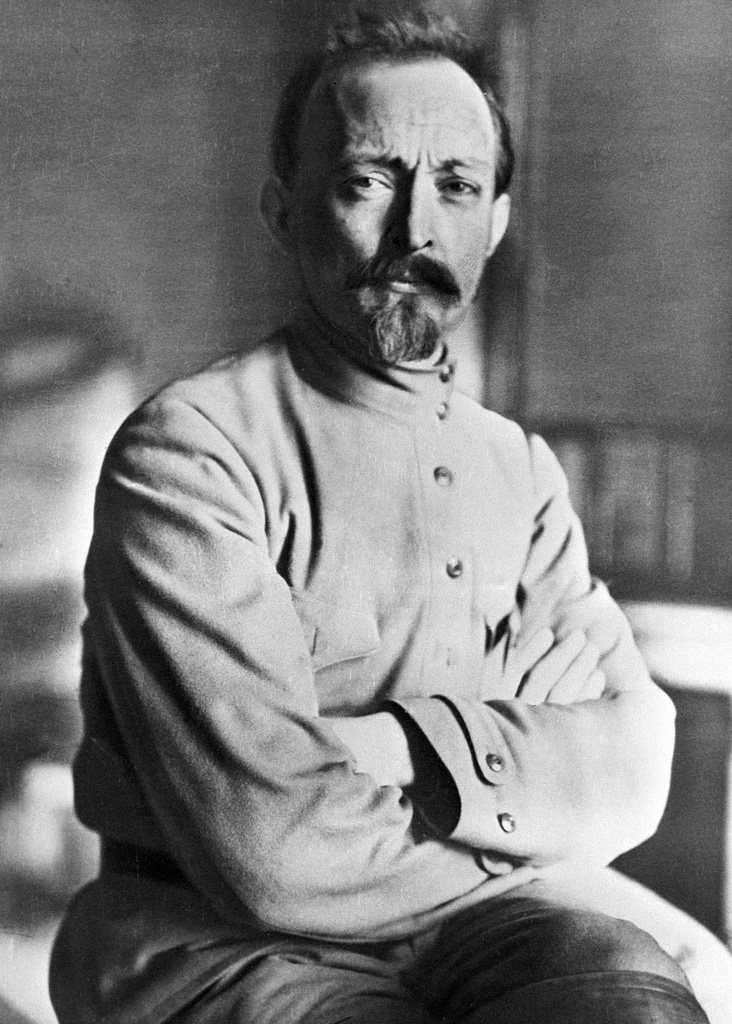This is an undated pamphlet published by Solidarity, a small British group
of libertarian socialists (the group is now defunct). The pamphlet is undated
but probably printed around 1970. It contains an English translation of a text
by Cornelius Castoriadis, a French left-wing intellectual of a libertarian
socialist bent. Castoriadis, who often wrote under the pen name Paul Cardan,
was the leading light of a small group with the dramatic name Socialisme ou
Barbarie (Socialism or Barbarism). Solidarity seems to have been the main
conduit of Cardan's ideas in Britain.
“From Bolshevism to the Bureaucracy” was originally Cardan's preface to a French edition of Alexandra Kollontai's famous pamphlet “The Workers Opposition”. The so-called Workers' Opposition was a dissident group within the Bolshevik Party, mostly known for its intervention at the tenth party congress in 1921. The opposition argued that the working class was in danger of losing power due to excessive bureaucratization, and that the management of Soviet industry and trade should be handed over to the trade unions rather than being the exclusive preserve of the Party. V I Lenin and Leon Trotsky weren't convinced (nor amused), and the infamous ban on “factions” was to a large extent aimed at silencing Kollontai and her supporters. This episode is important, since it shows that the bureaucratic degeneration of the Russian revolution started already under Lenin and Trotsky as a result of conscious Party decisions. Trotskyists, by contrast, still argue that all bureaucratization under Lenin was the result of strictly “objective” factors (such as the Civil War), that Lenin and Trotsky opposed it, and that it wasn't until Lenin's death and Trotsky's ouster that the bureaucracy finally took power (headed by a certain Joseph Stalin). The irony of Trotsky being hit in the head by the same “ban on factions” used by himself to silence Kollontai is usually lost on these people.
Cardan's text is obviously a polemic against Trotskyism, and is liberally sprinkled with quotations from Trotsky's notorious work “Terrorism and Communism”. Cardan rejects purely “objective” explanations for the bureaucratization of Soviet Russia. The Civil War, the international isolation of the revolution and the economic dislocation were real, to be sure, but they might just as well have led to the fall of Bolshevism and the victory of the White Guards. (I would add other possibilities to the list: a populist regime, a Menshevik government, the division of Russia into a dozen nationalist-controlled republics, foreign occupation or complete chaos.) Instead, the revolution defeated its enemies, only to succumb to bureaucratic degeneration from within. Why did the defeat of the working class take *this specific form* rather than some other? Objective factors alone cannot explain it. There is an additional X factor somewhere. What is it?
The X factor is, Cardan argues, the entire prior practice of Bolshevism. This is really a no-brainer, but trust me, Trotskyists really don't get it! Bolshevism was always an authoritarian movement with the ultimate goal of creating a one-party state, a movement which converged with the revolutionary workers only temporarily. During the revolutionary year 1917, workers and peasants often took radical action without the prior consent of the Party, indeed, sometimes against its wishes. As a libertarian socialist, Cardan puts his emphasis on the Bolsheviks' top-down view of the economy and attendant exclusion of workers' self-management. Somewhat idiosyncratically, he regards Bolshevik practice as “capitalist” since it included the Taylor system and piece work at factory level, appointments rather than elections of plant managers, etc. Why should authoritarian party leadership of this type lead to any other results than the bureaucratization of the revolution? Why expect a party completely beholden to “capitalist” methods to reproduce anything else than “capitalist” social relations? Note also that other civil wars in history didn't lead to one-party states and centralized planning. Perhaps because, ahem, they weren't fought and won by Bolsheviks…
There is much truth in this, and some paragraphs in this pamphlet are simply brilliant. It's simply amazing how much Leninists, including Trotskyists, have managed to mystify these issues. However, there are also some problems with Cardan's analysis. On the one hand, he tends towards a kind of idealism: “In so far as ideas play a role in historical development, and, *in the final analysis*, their role is enormous, Bolshevik ideology (and some aspects of the Marxist ideology underlying it) were decisive factors in the development of the Russian bureaucracy”. On the other hand, when discussing the bureaucracy as such, Cardan treats it as a product of objective material factors, not “ideas”. Thus, he believes that there are two types of bureaucracy in the modern world. The first type is the managerial-administrative stratum made necessary by large scale capitalist production and societal complexity. The other is the type of bureaucracy found in the Third World, which takes political power in place of a weak bourgeoisie, and attempts to modernize society through centralized planning. He mentions China as an example of this. (The Russian bureaucracy is closest to the second type, but is unique since it took power during the degeneration of a working class revolution.) Here, Cardan is clearly talking about objective conditions. So why does he emphasize “ideas” in the Bolshevik case? How “final” is the “final analysis” in which ideas are “decisive”?
I think the problem is Cardan's utopianism. On some level, he probably does believe that Kollontai and the Workers Opposition could have saved the Russian revolution and create some kind of self-managed proletarian utopia. Hence, if the leadership (or non-leadership) of the revolution just had the right ideas, they could presumably have pulled themselves up by their bootstraps. In reality, workers' self-management and libertarian socialism were the least likely outcomes of Red October, but you probably need to break more decisively with leftist dogma to realize that…


.jpg)



.png)